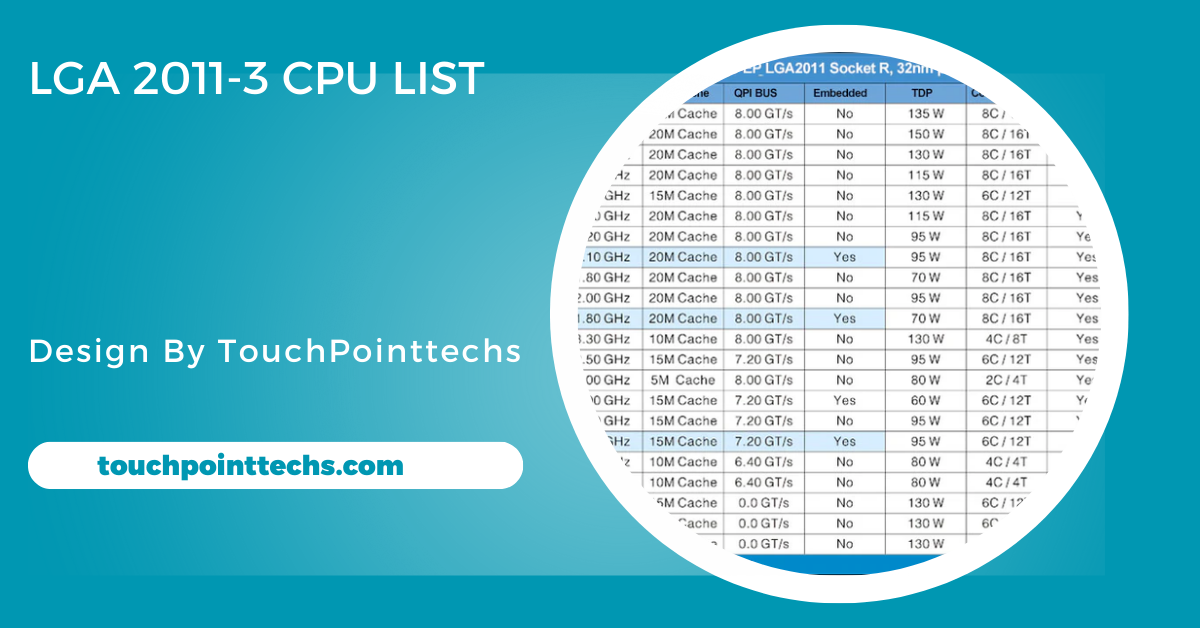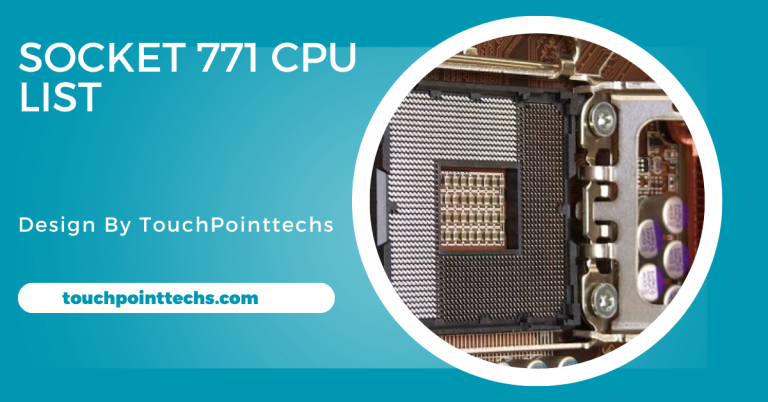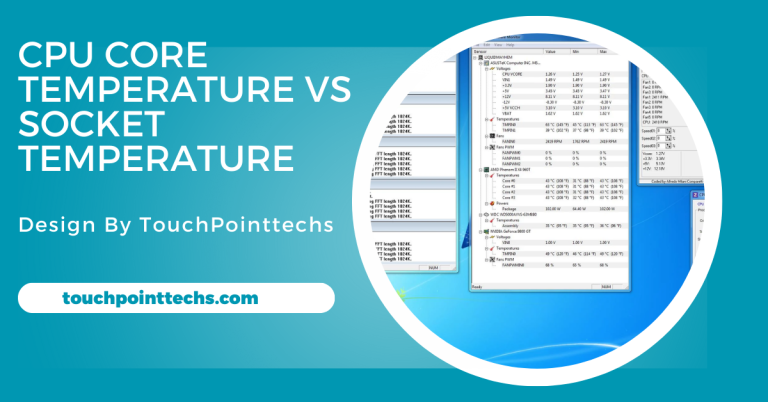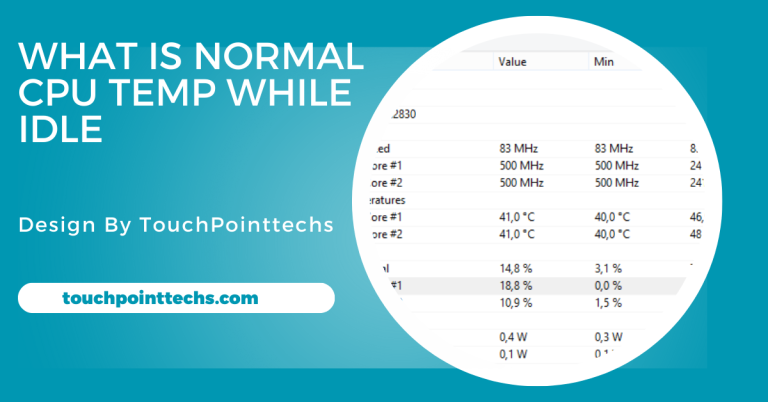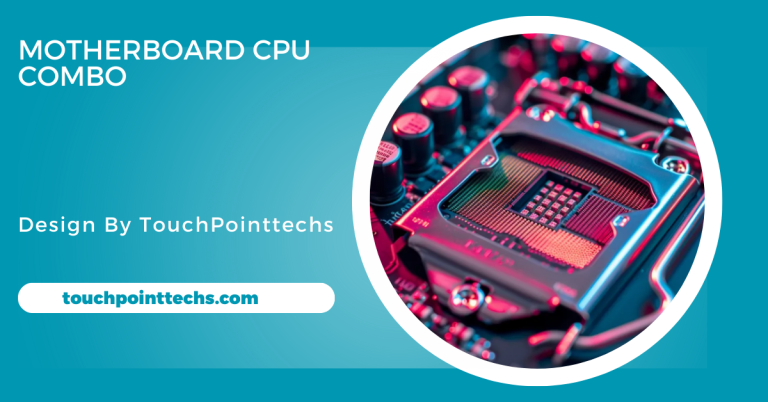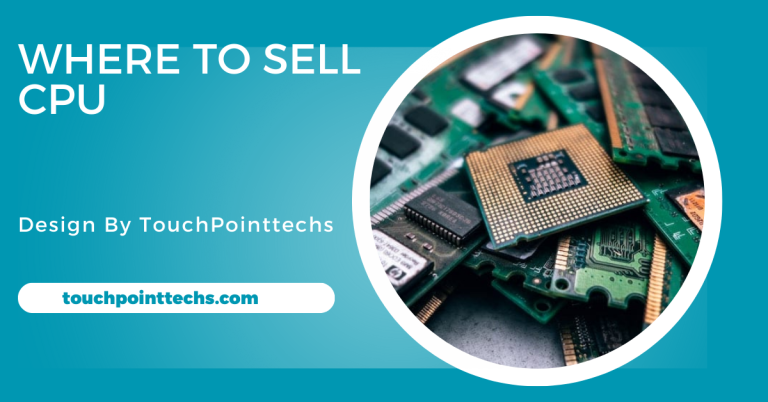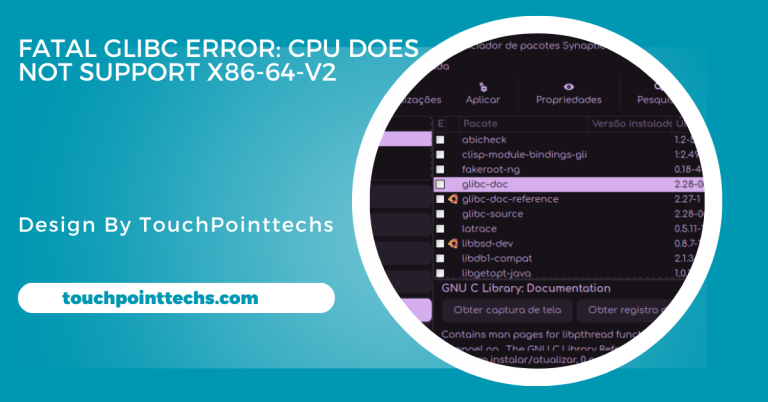Lga 2011-3 Cpu List – Your Ultimate Selection!
The LGA 2011-3 socket supports high-performance Intel Xeon and Core i7 CPUs, enhancing desktop and workstation performance with DDR4 memory and overclocking capabilities.
The LGA 2011-3 socket, also known as Socket R3, is a processor socket designed for high-performance Intel CPUs, specifically for desktop and workstation platforms. This socket is used mainly in the Intel Xeon and Intel Core i7 processors.
In this article, we will provide an easy-to-understand and SEO-friendly overview of the LGA 2011-3 CPU list, including various processor models, their features, and performance.
Table of Contents
What is LGA 2011-3?
The LGA 2011-3 socket was introduced by Intel as a successor to the LGA 2011 socket. It was designed to support the Haswell-E and Broadwell-E series of processors, offering enhanced performance and efficiency.
This socket is commonly used in high-end desktop platforms (HEDT) and workstation environments, where users demand powerful computing capabilities for tasks like gaming, 3D rendering, and video editing.
Key Features of LGA 2011-3:
The LGA 2011-3 socket is designed for high-performance computing, providing several important features that enhance its capabilities. Below, we explore these key features in detail.
Supports DDR4 Memory:
One of the most significant upgrades with the LGA 2011-3 socket is its support for DDR4 memory. This advancement offers numerous benefits:
- Faster Data Transfer Speeds: DDR4 memory significantly increases data transfer rates, enhancing overall system performance. This is especially beneficial for tasks that require high bandwidth, such as gaming, video editing, and 3D rendering.
- Improved Power Efficiency: DDR4 consumes less power than its predecessor, DDR3. This leads to lower heat generation and better system stability under heavy workloads, making it ideal for both gaming rigs and professional workstations.
Designed for High-Performance CPUs:
The LGA 2011-3 socket supports a range of high-performance processors, including the Intel Core i7 and Intel Xeon series.
- Intel Core i7 Processors: These CPUs are tailored for enthusiasts, gamers, and content creators who demand high-speed processing and multi-threading capabilities for smooth performance in gaming and creative applications.
- Intel Xeon Processors: Designed for servers and workstations, these processors excel in multi-core performance, making them suitable for professional applications such as virtualization, scientific computing, and complex simulations.
Quad-Channel Memory Support:
A unique feature of the LGA 2011-3 socket is its ability to support quad-channel memory configurations. This offers several advantages:
- Increased Memory Bandwidth: Quad-channel memory significantly boosts memory throughput, enhancing data transfer rates and reducing bottlenecks. This is particularly useful in memory-intensive applications where performance is critical.
- Ideal for Multitasking: With quad-channel memory support, users can run multiple applications simultaneously without experiencing performance drops. This makes the LGA 2011-3 an excellent choice for multitasking environments.
Overclocking Capabilities:
Many processors compatible with the LGA 2011-3 socket come with overclocking capabilities:
- Enhanced Performance: Overclocking allows users to push their processors beyond standard clock speeds, providing additional performance in demanding applications such as gaming and content creation.
- Customizable for Enthusiasts: Overclocking offers advanced users control over their system’s performance, enabling them to fine-tune settings for optimal efficiency according to their needs.
High Core Count Support:
The LGA 2011-3 socket supports processors with multiple cores and threads, making it particularly suitable for professional and multitasking environments.
- Multicore Processors: Options include processors with 6, 8, 12, and even up to 22 cores. This allows the socket to handle extensive workloads and run applications that require significant computational power.
- Hyper-Threading Technology: Many LGA 2011-3 processors feature Hyper-Threading, which doubles the number of threads per core. This improves multitasking and performance for software that can leverage multiple threads effectively.
Intel Processors Compatible with LGA 2011-3:
The LGA 2011-3 socket supports a range of Intel processors, including the Intel Core i7 and Intel Xeon series. Below is a detailed list of some of the popular CPUs that work with this socket.
1. Intel Core i7-5960X
The Intel Core i7-5960X is a high-end desktop processor designed for extreme performance. It features 8 cores and 16 threads, making it ideal for multitasking, gaming, and professional applications like video editing and 3D rendering.
Key Specifications:
- Cores/Threads: 8/16
- Base Clock: 3.0 GHz
- Max Turbo Frequency: 3.5 GHz
- TDP (Thermal Design Power): 140W
- Memory Support: DDR4-2133 (Quad-channel)
The i7-5960X is perfect for enthusiasts who need maximum performance for multitasking and power-hungry applications.
2. Intel Core i7-5930K
The Intel Core i7-5930K is a slightly more affordable option compared to the i7-5960X. It has 6 cores and 12 threads, providing excellent performance for gaming and other high-demand tasks.
Key Specifications:
- Cores/Threads: 6/12
- Base Clock: 3.5 GHz
- Max Turbo Frequency: 3.7 GHz
- TDP: 140W
- Memory Support: DDR4-2133 (Quad-channel)
The i7-5930K is a great choice for users looking for high performance without breaking the bank.
3. Intel Core i7-5820K
The Intel Core i7-5820K offers a more budget-friendly option in the LGA 2011-3 lineup. With 6 cores and 12 threads, it provides a balance between performance and price, making it suitable for gamers and content creators.
Key Specifications:
- Cores/Threads: 6/12
- Base Clock: 3.3 GHz
- Max Turbo Frequency: 3.6 GHz
- TDP: 140W
- Memory Support: DDR4-2133 (Quad-channel)
For users looking for decent performance without the extreme price tag, the i7-5820K is a solid choice.
4. Intel Xeon E5-2699 v4
The Intel Xeon E5-2699 v4 is a server-grade processor that brings extreme multitasking capabilities. It is designed for professional workstations and servers that handle multiple virtual machines, 3D rendering, and other high-end tasks.
Key Specifications:
- Cores/Threads: 22/44
- Base Clock: 2.2 GHz
- Max Turbo Frequency: 3.6 GHz
- TDP: 145W
- Memory Support: DDR4-2400 (Quad-channel)
The Xeon E5-2699 v4 is an excellent choice for users who need unparalleled multitasking performance.
5. Intel Xeon E5-2680 v4
The Intel Xeon E5-2680 v4 is another powerful processor in the Xeon family, offering 14 cores and 28 threads. It is designed for data centers, workstations, and professional environments requiring heavy multitasking.
Key Specifications:
- Cores/Threads: 14/28
- Base Clock: 2.4 GHz
- Max Turbo Frequency: 3.3 GHz
- TDP: 120W
- Memory Support: DDR4-2400 (Quad-channel)
The E5-2680 v4 is a balanced choice for users looking for high performance and efficiency in a professional setting.
Benefits of Using LGA 2011-3 CPUs:
Choosing an LGA 2011-3 processor has several benefits, especially for users who need high-performance computing. Below are some of the advantages of using these CPUs:
1. Multicore Performance
Most processors compatible with the LGA 2011-3 socket offer multiple cores and threads, making them perfect for multitasking and running applications that require a lot of processing power.
2. Ideal for Professionals
The LGA 2011-3 socket is widely used in professional environments like 3D rendering, video editing, and running virtual machines. These processors are powerful enough to handle complex workloads efficiently.
3. Support for DDR4 Memory
LGA 2011-3 CPUs support DDR4 memory, which is faster and more energy-efficient compared to older DDR3 memory. This ensures smoother performance, especially in data-intensive tasks.
4. Overclocking Capabilities
Many processors in the LGA 2011-3 lineup, such as the Intel Core i7 series, offer overclocking features. This allows users to push their CPUs beyond their base clock speeds for additional performance gains, especially in gaming.
How to Choose the Right LGA 2011-3 CPU?
When selecting a CPU for your LGA 2011-3 motherboard, there are a few key factors to consider:
- Purpose: Your specific use case will dictate the right CPU choice. If you are a gamer, an Intel Core i7 processor with 6-8 cores would be a good fit. However, for server environments or professional tasks like 3D rendering, a high-core-count Xeon processor would be better.
- Budget: LGA 2011-3 CPUs vary widely in price. Intel Xeon processors are generally more expensive due to their high core count and professional features. The Intel Core i7 series offers a more affordable option without compromising too much on performance.
- Power Consumption: The TDP (Thermal Design Power) of a processor determines how much heat it generates and how much power it consumes. High-performance CPUs like the Xeon E5-2699 v4 may require advanced cooling solutions, so be sure to consider this when building your system.
FAQ’s
1. What is the LGA 2011-3 socket?
The LGA 2011-3 socket is a processor socket for Intel high-performance CPUs, mainly supporting Intel Xeon and Core i7 processors for desktops and workstations.
2. What types of memory does LGA 2011-3 support?
LGA 2011-3 supports DDR4 memory, which offers faster data transfer speeds and improved power efficiency compared to DDR3.
3. Which processors are compatible with LGA 2011-3?
Compatible processors include Intel Core i7 models such as i7-5960X, i7-5930K, and i7-5820K, as well as Xeon models like E5-2699 v4 and E5-2680 v4.
4. What are the benefits of using LGA 2011-3 CPUs?
Benefits include high multicore performance, support for DDR4 memory, overclocking capabilities, and suitability for professional applications like 3D rendering and video editing.
5. How do I choose the right LGA 2011-3 CPU for my needs?
Consider your use case such as gaming versus professional tasks, your budget, and power consumption to select the appropriate Intel Core i7 or Xeon processor.
Conclusion
In summary, the LGA 2011-3 socket supports high-performance Intel Core i7 and Xeon processors, offering features like DDR4 memory and overclocking. It’s an excellent choice for gaming and professional tasks, providing enhanced performance and efficiency for demanding applications.

